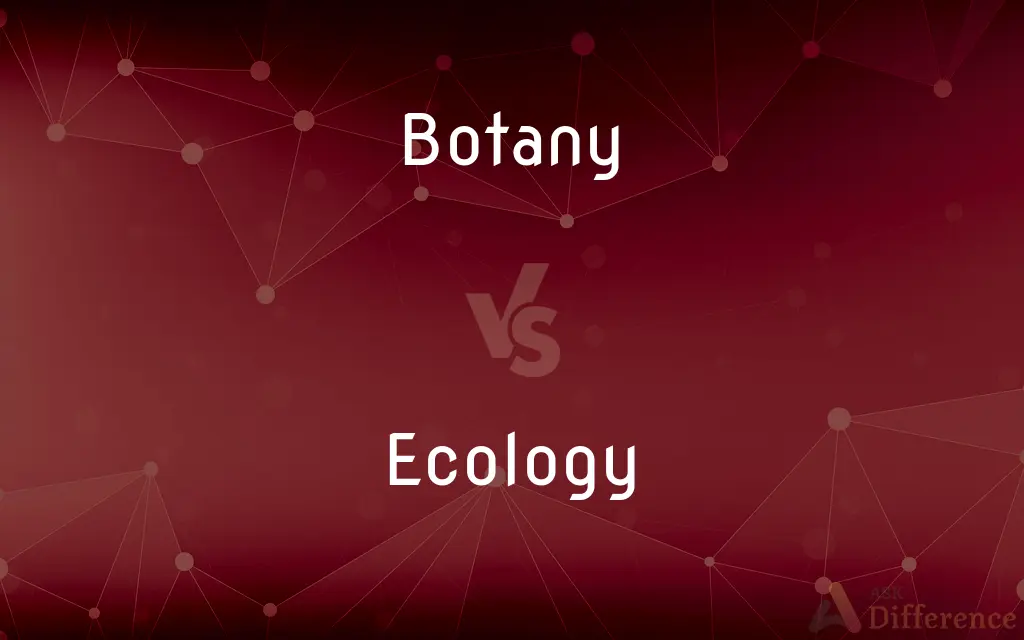Botany vs. Ecology — What's the Difference?
By Tayyaba Rehman & Maham Liaqat — Updated on April 27, 2024
Botany focuses on the study of plants, their structures, and processes, while ecology examines interactions between organisms and their environments.

Difference Between Botany and Ecology
Table of Contents
ADVERTISEMENT
Key Differences
Botany is the scientific study of plants, including their physiology, structure, genetics, ecology, distribution, classification, and economic importance, focusing on plant life directly. On the other hand, ecology deals broadly with the relationships between organisms, including plants, animals, and microbes, and their physical surroundings, thus encompassing a wider scope of biological interactions.
In botany, research often concentrates on plant characteristics and behaviors in controlled environments to understand specific biological processes, whereas ecology frequently involves field studies and holistic approaches to investigate how various biotic and abiotic factors influence community dynamics and ecosystem functions.
Botanists may specialize in areas such as plant physiology, taxonomy, or paleobotany, each dealing with different aspects of plant life and development. In contrast, ecologists might focus on areas like population dynamics, ecosystem ecology, or conservation biology, which involve understanding interactions at various levels, from individual organisms to entire ecosystems.
Botanical studies can lead to advances in agriculture, horticulture, and pharmacology by improving plant breeding, pest control, and crop yields. Meanwhile, ecological studies are crucial for environmental policy, conservation efforts, and understanding the impacts of human activity on natural habitats, highlighting its broader environmental applications.
While botany is fundamentally centered on plants and their life processes, ecology encompasses a broader spectrum, considering both biotic components, like animals and plants, and abiotic components, like climate and geography, integrating these elements into a comprehensive study of life environments.
ADVERTISEMENT
Comparison Chart
Focus
Plant life
Interactions among organisms and environment
Research Approach
Often experimental
Often observational and systemic
Specializations
Plant physiology, taxonomy
Population dynamics, ecosystem ecology
Applications
Agriculture, pharmacology
Environmental policy, conservation
Study Components
Primarily plants
Biotic and abiotic components
Compare with Definitions
Botany
The scientific study of plant life and development.
She studied botany to understand the medicinal properties of local plant species.
Ecology
The study of interactions between organisms and their environment.
Ecology covers how plants, animals, and microbes interact within various ecosystems.
Botany
Involved in advancements in areas such as agriculture and pharmacology.
Through botany, researchers have developed drought-resistant crops.
Ecology
Often uses modeling and simulations to predict environmental impacts.
Ecologists use computer models to predict the impacts of climate change on ecosystems.
Botany
A branch of biology that focuses on the physiology and classification of plants.
His botany course covered everything from cellular processes to ecosystem impacts of plants.
Ecology
Focuses on understanding natural systems and their stability, dynamics, and health.
He focuses on marine ecology, studying how oceanic life affects and is affected by environmental factors.
Botany
Often requires laboratory work and field studies.
Botany students often spend time in both labs and natural settings, studying plant life directly.
Ecology
Essential for environmental conservation and management practices.
Ecological studies inform conservation strategies that help preserve endangered species.
Botany
May include the study of plant ecology as a sub-discipline.
Botany not only explores plant genetics but also how plants interact with their environments.
Ecology
Can be divided into many sub-disciplines, including urban, industrial, and conservation ecology.
Urban ecology examines how cities can be planned and managed to harmonize with nature.
Botany
Botany, also called plant science(s), plant biology or phytology, is the science of plant life and a branch of biology. A botanist, plant scientist or phytologist is a scientist who specialises in this field.
Ecology
Ecology (from Greek: οἶκος, "house" and -λογία, "study of") is the study of the relationships between living organisms, including humans, and their physical environment [1], [2]. Ecology considers organisms at the individual, population, community, ecosystems, and biosphere level.
Botany
The science or study of plants.
Ecology
The science of the relationships between organisms and their environments.
Botany
A book or scholarly work on this subject.
Ecology
The relationship between organisms and their environment.
Botany
The plant life of a particular area
The botany of the Ohio River valley.
Ecology
See human ecology.
Botany
The characteristic features and biology of a particular kind of plant or plant group.
Ecology
(biology) The branch of biology dealing with the relationships of organisms with their environment and with each other.
Botany
(uncountable) The scientific study of plants, a branch of biology. Typically those disciplines that involve the whole plant.
Ecology
The branch of biology concerned with the various relations of animals and plants to one another and to their surrounding environment.
Botany
The plant life of a geographical area; flora.
The botany of Greenland
Ecology
The environment as it relates to living organisms;
It changed the ecology of the island
Botany
The properties and life phenomena exhibited by a plant, plant type, or plant group.
Ecology
The branch of biology concerned with the relations between organisms and their environment
Botany
(countable) A botanical treatise or study, especially of a particular system of botany or that of a particular place.
Botany
The science which treats of the structure of plants, the functions of their parts, their places of growth, their classification, and the terms which are employed in their description and denomination. See Plant.
Botany
A book which treats of the science of botany.
Botany
The branch of biology that studies plants
Common Curiosities
What are common careers for botanists and ecologists?
Botanists often work in agriculture, conservation, and research, while ecologists may work in environmental consulting, conservation, and academic research.
How do botany and ecology differ in focus?
Botany focuses specifically on plants, while ecology deals with interactions within ecosystems, including both biotic and abiotic components.
How does ecological research impact conservation?
Ecological research helps in understanding ecosystem functions and the impact of human activities, crucial for effective conservation strategies.
Are there ethical concerns associated with botany or ecology?
Both fields consider ethical concerns, especially in terms of environmental impact and conservation of biodiversity.
What does ecology study?
Ecology studies the relationships between organisms, including plants, animals, and microbes, and their environments.
What role does botany play in climate change research?
Botany contributes to climate change research by studying plant responses to varying climates and developing resilient plant varieties.
How is ecological knowledge applied in urban planning?
Ecologists influence urban planning by advising on sustainable practices and the integration of natural ecosystems into urban environments.
Can botany and ecology overlap?
Yes, plant ecology is a common overlap, where botanists focus on how plants interact with their environments within ecological contexts.
What methodologies are common in ecological studies?
Ecological methodologies often include field surveys, GIS mapping, and long-term ecological monitoring.
What is botany?
Botany is the scientific study of plants, including their structure, properties, and biochemical processes.
What tools are typically used by botanists?
Botanists use tools ranging from microscopes for cellular studies to drones for monitoring large vegetation areas.
How do educational paths differ for botany and ecology?
Botany students typically focus more on plant biology courses, while ecology students engage in broader studies involving various ecosystem components.
Share Your Discovery

Previous Comparison
Voltage vs. Current
Next Comparison
Difficultly vs. DifficultyAuthor Spotlight
Written by
Tayyaba RehmanTayyaba Rehman is a distinguished writer, currently serving as a primary contributor to askdifference.com. As a researcher in semantics and etymology, Tayyaba's passion for the complexity of languages and their distinctions has found a perfect home on the platform. Tayyaba delves into the intricacies of language, distinguishing between commonly confused words and phrases, thereby providing clarity for readers worldwide.
Co-written by
Maham Liaqat















































